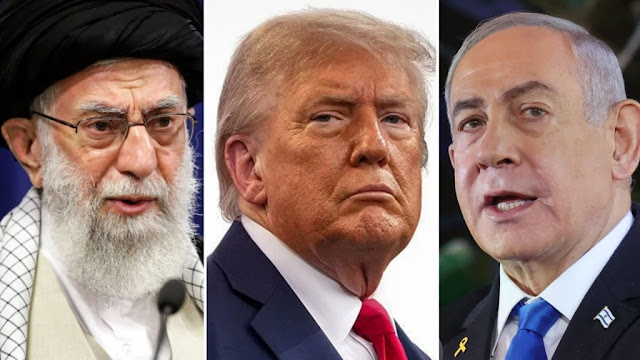President Donald Trump on Sunday signaled continued U.S. support for Israel’s military campaign against Iran, saying the United States stands behind Israel’s right to self-defense while leaving the door open to a potential diplomatic resolution.
As he departed for the G7 summit in Canada, Trump confirmed to reporters that the U.S. will continue backing Israeli airstrikes amid escalating tensions between the two Middle Eastern powers.
“We do,” Trump responded when asked whether the U.S. would support Israel’s military efforts. When pressed on whether he had encouraged Israel to hold back, Trump replied, “I wouldn’t say that.”
The remarks come as Israel and Iran exchanged strikes for a third straight day, marking a dangerous escalation in the region. Iranian missiles have managed to breach some Israeli air defenses, while Israel’s retaliatory strikes have reportedly targeted high-ranking Iranian military officials.
Despite reaffirming military support, Trump hinted at an interest in seeking a diplomatic off-ramp. “It’s time for a deal,” he said. “Sometimes they have to fight it out. We’ll see what happens.”
The President highlighted his close relationship with Israeli Prime Minister Benjamin Netanyahu, whom he spoke with on Friday. “We get along very well and I think we have great respect for each other,” Trump said.
Still, questions remain about how involved the U.S. may become. In an interview with ABC News earlier Sunday, Trump said “it’s possible” that the U.S. could get involved in the conflict, though he emphasized that it is not currently engaged.
“We’re not involved in it. It’s possible we could get involved. But we are not at this moment involved,” he said.
Push for Diplomacy? Putin Enters the Picture
Trump also told ABC News he is open to a potential mediation role by Russian President Vladimir Putin.
“[Putin] is ready. He called me about it. We had a long talk about it,” Trump said. “We talked about this more than his situation. This is something I believe is going to get resolved.”
While the administration has publicly attempted to keep some distance from Israel’s latest strikes—which were among its most extensive ever—questions persist about U.S. foreknowledge. Officials within the Trump administration were reportedly briefed before the strikes that killed several Iranian commanders.
Secretary of State Marco Rubio addressed the issue Thursday night. “Tonight, Israel took unilateral action against Iran. We are not involved in strikes against Iran and our top priority is protecting American forces in the region,” Rubio said. “Israel advised us that they believe this action was necessary for its self-defense.”
Rubio also reiterated the administration’s commitment to regional stability and communication with allies. “President Trump and the Administration have taken all necessary steps to protect our forces and remain in close contact with our regional partners,” he said.
A Growing Crisis, a Shifting Strategy
The conflict comes at a precarious time for Trump, who has simultaneously pursued a new nuclear agreement with Iran. Israeli strikes have cast a shadow over that diplomatic push, forcing the administration to recalibrate its strategy as events unfold on the ground.
While Trump’s comments reflect a willingness to explore diplomacy, they also underscore the challenges of balancing support for an ally with efforts to avoid deeper U.S. military entanglement.











